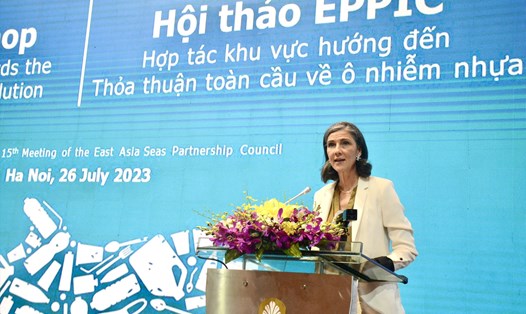Protecting the environment from film printing
At Quang Ninh General Hospital, the Hospital used to have to print about 3,000 films/month, the cost of buying films alone was 1.5 billion VND per year. The treatment of film washing water is very complicated and expensive because the film is contaminated with lead. If not well controlled, this waste will cause poisoning and environmental pollution.
Doctor Ngo Quang Chuc - Head of the Department of I.G. diagnostic Imaging - said: Currently, when patients come for X-rays, the results will be sent to the patient's phone number, without having to wait for the film. This is not only convenient for patients but also saves costs for hospitals, while helping to protect a green, clean and beautiful environment.
When still using paper records, the hospital had to arrange a warehouse to store patient records and data for decades. Now, with the use of electronic medical records, hospitals can easily manage records, minimizing medical waste.
Digital transformation of healthcare, the removal of paper records, paper prescriptions and not printing plastic films have helped the hospital save billions of dong, especially reducing plastic waste and hazardous waste, protecting the hospital environment.
With digital transformation, what makes patients most satisfied is that they can proactively grasp the medical examination and treatment process without having to anxiously wait for the time when it is their turn or when the results will be available.
The total time from the time of arrival at the hospital to departure has decreased by more than 2 hours. Doctors are also more convenient in diagnosing and treating...
According to the Ministry of Health, a few years ago, the cost of purchasing annual film for hospitals in Vietnam was about 2,000 billion VND. Associate Professor, Dr. Tran Quy Tuong - Chairman of the Vietnam Medical Informatics Association - said that with PACS software when applied in Vietnam, the cost is only 50% of the film's value. PACS, if implemented synchronously, will not only help medical facilities save costs and improve the quality of diagnosis but also protect the environment.
Hospitals strive to reduce plastic waste
At the Central Lung Hospital, the implementation of measures to reduce plastic waste in the hospital has been implemented for many years. Hospitals popularly recommend that patients and their families do not use disposable plastic items, and hard-to-decompose nylon bags, instead using environmentally friendly products.
In meetings, conferences, seminars, and training held at hospitals, plastic bottles (one-time use) are no longer used to contain water, instead, glass, porcelain, or paper water cups are used.
The hospital has purchased self-dismantling nylon bags to collect medical solid waste in departments, rooms, and centers, which has reduced emissions to the outside of a large amount ofnylon bags that are difficult to decompose. On average, the hospital uses about 27,000 nylon bags containing medical solid waste each year.
The Infection Control Department has had many initiatives to reduce plastic waste such as: Using pineapple loads (which can be reused many times) to contain recycled waste such as glass bottles; using stainless steel bins to package medical equipment, surgical fabric to replace a large amount of nylon bags to package previous equipment.
At Uong Bi Hospital - Sweden, the medical plastic waste management initiative has helped the hospital earn a total profit of nearly 475 million VND in 2023. Thanks to the steaming method, the hospital has successfully treated 45,800kg of infectious medical waste, converting them into recyclable common waste.
Specialist nurse I Truong Thi Kieu Oanh, Head of the Department of Infection Control - Vietnam - Sweden Uong Bi Hospital - said that to reduce waste, especially medical plastic waste, the hospital has researched and coordinated with experts from the Department of Health Environment Management (Ministry of Health) to implement effective treatment solutions.
This non-commercial evaporation method does not generate smoke, dust or toxic gas, significantly reducing the risk of air, soil and water pollution.
The Hanoi Department of Health recommends that the Health Center advise the People's Committees of districts, towns and cities to organize activities to respond and propagate directly and online on environmental protection, health protection, and climate change adaptation. The content includes: Limiting non-degradable nylon bags and single-use plastic products; promoting recovery, recycling and reuse; encouraging the use of environmentally friendly products; reducing the burning of straw, honeycomb coal stoves; strengthening waste management.










